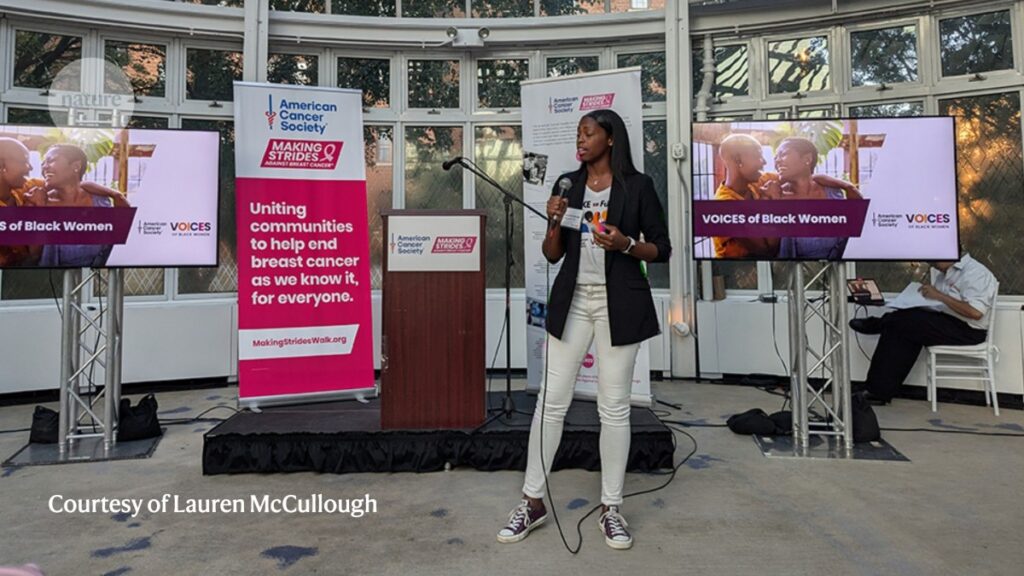Epidemiologist Lauren McCullough is leading the VOICES of Black Women study.Credit: Courtesy of Lauren McCullough
When epidemiologist Lauren McCullough began working in cancer research in the United States, she was struck by a glaring omission in population-level studies. “When thinking about large-scale cancer studies, one of the groups that have been left behind have been Black women,” she says. “That’s despite the fact that Black women are more likely to get an aggressive disease and, with very few exceptions, are more likely to die of their cancer.”
Now, McCullough, visiting scientific director at the American Cancer Society (ACS), is leading a research effort to help change that. The VOICES of Black Women study aims to enrol 100,000 Black women aged 25–55 with no prior history of cancer. The longitudinal study, which launched in 2024, will follow participants for at least 30 years, capturing a range of data on health, lifestyle and lived experience to reach a depth and scale not seen before for this population, say those involved.
For McCullough and Alpa Patel, co-investigator on the study and senior vice-president of population science at the ACS, researchers on the team had to be more than just experts. They wanted people who “really had the passion for the topic and were committed to ensuring the study was going to be designed and executed in a way that we all felt really proud of”, McCullough says.

Nature Index 2025 Research hospitals
The VOICES team hope the data will begin to clarify what is behind disparities in cancer risk for Black women in the United States. They are around 40% more likely to die from breast cancer than white women, for example, despite having lower incidence rates. According to the ACS, Black women have a 12% higher overall cancer death rate than white women.
Initially spanning the 20 US states with the largest populations of Black women, the study now recruits nationwide, working in partnership with a network of hospitals, community organizations and health centres.
The VOICES team wants to look beyond the biological data typical of a standard longitudinal study — such as genetics, diet or medical history — to capture some of the potential social drivers of health. “Something that was really missing when I emerged from my training was understanding how the social aspects impact cancer,” McCullough says. “How do social elements above the skin impact the biology below the skin?” To that end, the study asks participants about factors such as their experiences of racism, access to quality health care and what social support they receive.
This information is collected through a 60-minute baseline survey and shorter follow-ups, in which participants are asked about day-to-day discrimination and economic stressors. “A lot of the existing data are at the area level, like residential racial segregation, but that doesn’t really capture the specific insults an individual might experience,” McCullough says. By capturing individual experiences, the team hopes to uncover how these cumulative exposures interact with biological processes to influence cancer risk.
This is important, McCullough says, because “the data among Black women doesn’t match our ideas about how socioeconomics should lead to better health outcomes. In fact, some of the greatest health disparities are among Black women with higher levels of socioeconomic status.” Recent studies have shown that racism-related stress contributes to persistent health gaps between Black and white women by disrupting cortisol patterns, as demonstrated in a 2024 study1 published in Scientific Reports, and by activating cellular stress-response pathways linked to aggressive breast cancer, according to research from the Duke Cancer Institute in Durham, North Carolina2. The VOICES study also includes biological sampling. Participants can voluntarily provide blood samples and undergo height, weight, waist and blood-pressure measurements. These will help researchers investigate the role of ancestry, hormones, inflammation, infections and genetic mutations in cancer development.
“In five years or so, I think we will better understand the various exposures that might differentially impact Black women,” says McCullough. For example, it could lead to better regulation of products frequently used by Black women, such as chemical hair relaxers, which were linked to an increased risk of uterine cancer by a 2023 study3.
Enrolled participants, who so far number almost 4,000, will receive regular follow-ups — two 30-minute surveys per year — with the hope this will build trust. McCullough says early feedback suggests participants feel their experiences are well represented.
“It takes a different level of comfort and trust to join a study. So, I am always grateful for every single person that joins,” she says.

